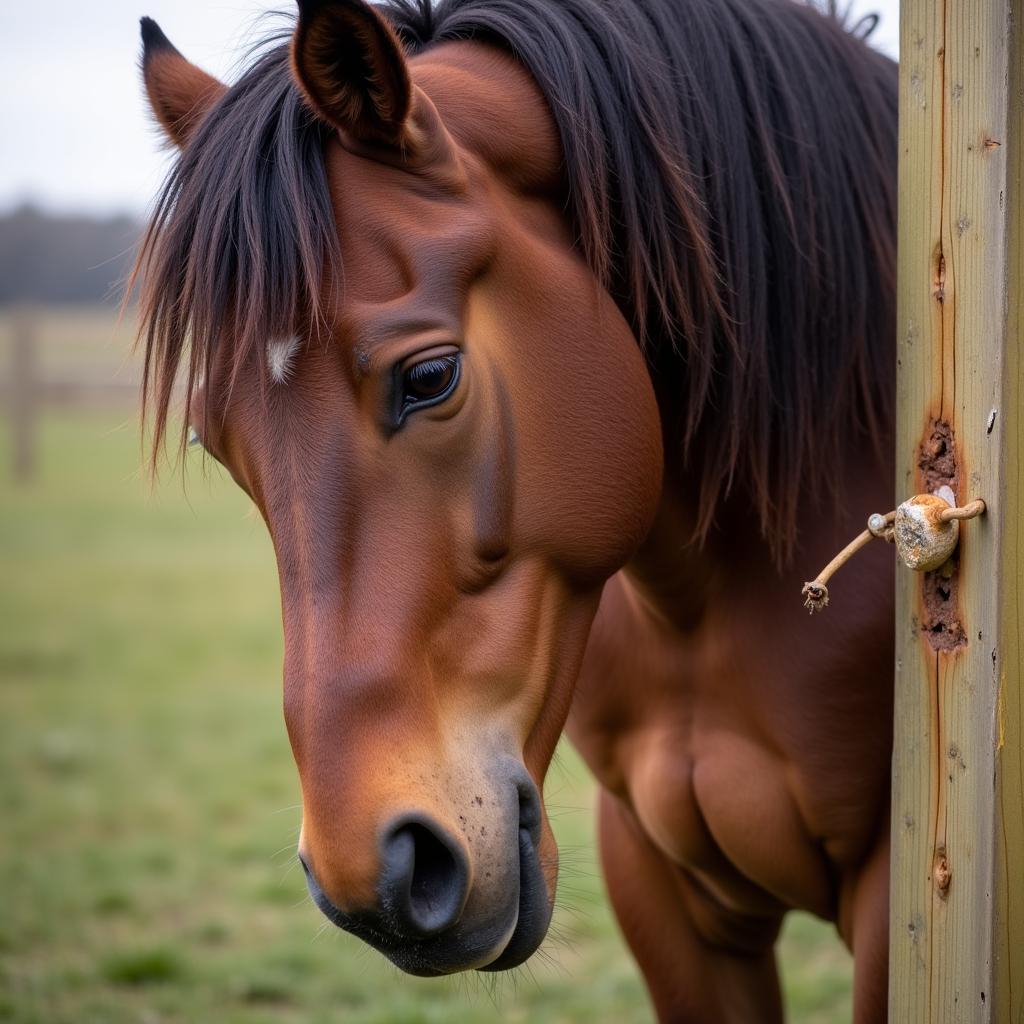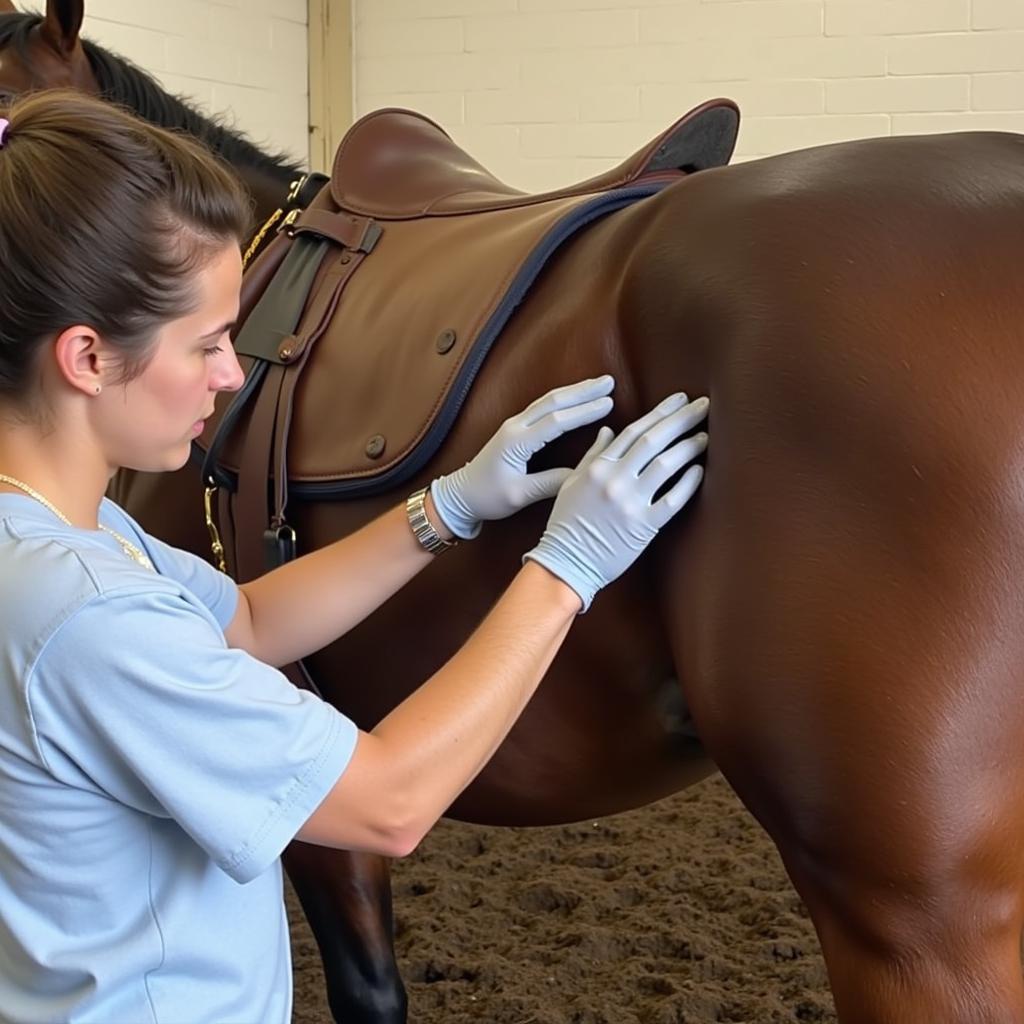Flea and tick prevention is a crucial aspect of horse care, ensuring your equine companion stays healthy and comfortable. These pesky parasites can cause various health issues, ranging from mild skin irritations to potentially life-threatening diseases. Understanding the importance of flea and tick prevention and implementing effective strategies is essential for every horse owner.
 Horse Scratching Due to Ticks
Horse Scratching Due to Ticks
Why Flea and Tick Control is Vital for Horses
Fleas and ticks are more than just a nuisance; they pose significant health risks to your horse. Here’s why prioritizing their control is vital:
- Skin Irritations and Allergies: Flea and tick bites often trigger allergic reactions in horses, leading to intense itching, hair loss, and secondary skin infections from excessive scratching.
- Anemia: Ticks are notorious bloodsuckers. A heavy infestation can lead to anemia, especially in young or already weakened horses.
- Disease Transmission: Both fleas and ticks act as vectors, transmitting various diseases to horses. Lyme disease, equine infectious anemia, and Potomac horse fever are just a few examples of serious illnesses these parasites can carry.
Effective Flea and Tick Prevention for Horses
Preventing flea and tick infestations is always better than treating them. Here are some proven methods to protect your horse:
1. Topical Treatments:
- Spot-on Treatments: These easy-to-apply solutions are placed directly on the horse’s skin, typically along the backline, and provide long-lasting protection, often for several weeks.
- Sprays: Flea and tick prevention horses sprays offer immediate coverage and are useful for treating larger areas. However, they require more frequent reapplication compared to spot-ons.
2. Oral Medications:
Oral medications provide systemic protection against fleas and ticks. These medications come in chewable tablets or pastes, making them convenient for many horse owners.
3. Environmental Control:
- Regular Pasture Management: Keeping pastures mowed and clear of tall grass and weeds can help reduce tick populations.
- Stable Hygiene: Regularly cleaning stalls, removing manure, and using bedding that discourages pests can help minimize the risk of flea and tick infestations.
 Horse Owner Applying Topical Flea and Tick Treatment
Horse Owner Applying Topical Flea and Tick Treatment
Choosing the Right Prevention Method
The best flea and tick prevention method for your horse depends on several factors, including:
- Age and Health of the Horse: Young foals, senior horses, and those with underlying health conditions may require specific treatments.
- Level of Exposure: Horses living in areas with high tick and flea populations might need more frequent or potent prevention methods.
- Lifestyle: Horses that are frequently transported or participate in shows or events may require different approaches compared to those living primarily on pasture.
It’s crucial to consult your veterinarian to determine the most appropriate and effective flea and tick prevention program for your horse’s specific needs.
Recognizing the Signs of Infestation
Even with preventive measures, it’s essential to regularly check your horse for signs of fleas and ticks. Look for:
- Excessive Scratching or Rubbing: This could indicate skin irritation caused by bites.
- Visible Fleas or Ticks: Carefully inspect your horse’s coat, particularly around the mane, tail, ears, and underbelly.
- Skin Lesions: Bites can cause redness, swelling, scabs, or hair loss.
What to Do If You Find Fleas or Ticks
If you discover fleas or ticks on your horse, don’t panic. Here are the steps to take:
- Remove Ticks Safely: Use fine-tipped tweezers to grasp the tick as close to the skin as possible. Pull upward with steady, even pressure, ensuring you remove the entire tick, including the head.
- Consult Your Veterinarian: Your vet can recommend appropriate treatment options for removing any remaining parasites and addressing potential diseases.
Can Horses Get Fleas from Other Animals?
Can horses have fleas? While horses have their own specific species of fleas, they are less common than those found on cats and dogs. However, it’s possible for horses to pick up fleas from other animals, especially if they share living spaces or come into close contact.
Conclusion
Protecting your horse from fleas and ticks is an essential aspect of responsible horse ownership. By understanding the risks, implementing effective prevention strategies, and remaining vigilant, you can ensure your equine companion stays happy, healthy, and free from these troublesome parasites.
Need help with your horse’s flea and tick prevention plan? Contact us at Phone Number: 0772127271, Email: [email protected] or visit us at QGM2+WX2, Vị Trung, Vị Thuỷ, Hậu Giang, Việt Nam. Our team is available 24/7 to assist you.